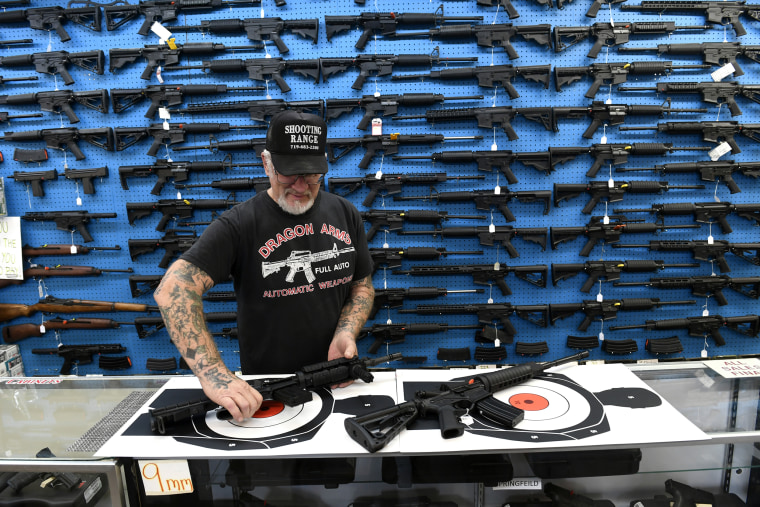WASHINGTON — A congressional committee is sharpening their scrutiny of the Bureau of Alcohol, Tobacco, Firearms and Explosives, questioning the agency’s oversight of gun dealers who sell firearms involved in a large number of crimes.
The inquiry, which comes after back-to-back mass shootings in El Paso, Texas, and Dayton, Ohio, has been welcomed by gun rights activists who have been raising questions about the ATF’s ability to do its job amid congressional restrictions that have hamstrung the agency.
In a letter sent Friday, House Oversight and Reform Committee Chairman Elijah Cummings, D-Md., asked the agency for a series of documents to “better understand enforcement efforts” of gun dealers that sell a large number of guns that are used in crimes.
The committee is asking for the top five gun dealers of each state that are responsible for the sale of guns recovered in crimes from January 1, 2014 to August 22, 2019 and the relevant information of each purchase, including the name and location of the dealer, the number of guns sold by each dealer involved in crimes and the number of homicides or assaults committed with the guns.
“The Committee is gravely concerned that current law enforcement efforts are not adequately addressing this crisis,” Cummings wrote. “This investigation will inform Congress’s ability to make changes in federal law that saves lives.”
The committee also asked to know what violations ATF found, and how the enforcement mechanisms implemented.
Federal law mandates that licenses are supposed to be inspected on either a three or five year basis — but Congress, which has oversight of the ATF, is unsure if that is happening.
The reason Congress is clueless is in part because of the rules Congress wrote, which have for years watered down its own ability to conduct oversight of the ATF — a policy priority of the National Rifle Association.
“These restrictions [imposed by Congress] protect the gun industry at the expense of the public safety. They prevent the ATF from effectively and efficiently policing the industry and thwart efforts to keep guns out of the hands of dangerous people,” said Josh Scharff, an attorney the Brady Campaign.
In 2003, Congress passed the Tiahrt amendment, named for the sponsor, former Rep. Todd Tiahrt, R-Kan., which prohibited ATF from releasing trace data — data about the sale of individual guns. Gun dealers are responsible for keeping their own records of gun sales and the Tiahrt amendment protected gun dealers from having to provide that information to the government.
A separate amendment, known as a rider, attached to appropriations bills over the years prohibited the ATF from digitizing their records on gun licenses, which gun rights activists say has made it extremely difficult to obtain any information because an understaffed, underfunded ATF has to manually go through records.
The Tiahrt amendment was added to every Commerce, Justice and Science Appropriations bill, but it was made less stringent in 2008 and 2010 by allowing ATF to provide the trace data to law enforcement and federal agencies in some instances if requested. And it allowed for the ATF to release trace data publicly, but only in the aggregate.
The NRA has not responded to a request for comment.
The ATF has long been under-resourced. Deputy Director Thomas Brandon, defied the White House and told Congress in March that the agency doesn’t have enough money and the president’s budget for 2020 would decimate the agency. “You hear people say, ‘trim the fat.’ Then we trimmed into the muscle and now we’re trimming into the bone,” Brandon told the House Appropriations Committee.
Two weeks later, Brandon announced his retirement, providing no reason. There is currently no director, with an acting deputy director running the agency. President Donald Trump announced nominated Kenneth “Chuck” Canterbury, the current president of the Fraternal Order of Police, to run the ATF in May. The Senate Judiciary Committee held a hearing on his nomination in July.
The House of Representatives, in its fiscal year 2020 funding bills, has attempted to reverse some of the trends. The most recent measure provides $1.44 billion for ATF, $122 million more than what was provided in 2019.
The appropriations bill also commissions a new study at the ATF on weapons trafficking and directs the FBI to study mass shootings. The last time that research was done was in 2000, when it found that 60 percent of guns used in crimes came from just 1 percent of gun dealers.
And for the first time in more than 20 years, the House has provided funding for the CDC to study the use of gun violence.
But those provisions still have to be approved by the Senate.

